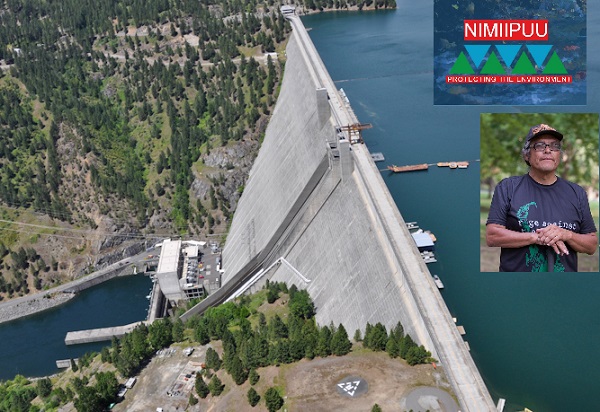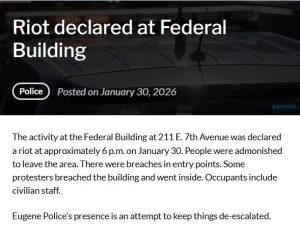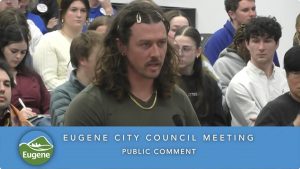Dam removals needed to prevent extinction of Lower Snake River salmonids
7 min read
At the July 13 Webinar Wednesday, the Oregon Community Rights Network welcomed Nez Perce leader Elliott Moffett.
[00:00:07] Elliott Moffett: I come from the Twisted Hair Band and that’s known to occupy the Clearwater region, the main stems and tributaries. Some are known by the streams even, some of our bands. The Asotin band, for an example, is on Asotin Creek. That’s so central to our lives that we name our bands after relationships with those particular waters.
[00:00:36] So that’s an example of how important it is when we’re by the water, when we’re told not to disrespect the water in any way. And so we have to live that way as well. And there would be people that would enforce those kinds of strictures, I guess we could call them.
[00:00:55] But yeah, there’s a lot of water, clean water here in Central Idaho. We have a lot, but that’s being degraded now. And that’s one of the reasons why we’re becoming as active as we need to be, because I can still remember those days, (laughs) being a young person and we’d be up the river swimming and no one would bring any water bottles or anything.
[00:01:22] We never needed to—we would drink right out of the river. We were never worried about that when I was growing up. Now everyone has to bring water bottles. So now we have plastic all over and so that’s degrading Mother Earth.
[00:01:36] Our people, we can’t depend on the water that we once did. We used to have springs along the roads here and they’re drying up. And so instead of stopping off and having a sip of spring water on your way from one place to another, we can’t do that anymore.
[00:01:54] We’ve had to look to the legal conventions to see if we can do a better job at protecting our water sources. The tribe has a water program and so they try to work with the Environmental Protection Agency, for an example, on clean water issues.
[00:02:13] But the water quality has been degraded. And basically that was done on our watch. We take responsibility for that. So we have to do something about it.
[00:02:24] John Q: One thing they’ve already done is bring a new approach to salmon management.
[00:02:29] Elliott Moffett: Before in salmon management you had the state boundaries— they would manage up to the boundaries. The federal government would manage federal properties. And so you had each one of these entities just doing their management and they weren’t in consideration of the whole river basin.
[00:02:48] The salmon, they go down and they have to pass through about nine hydroelectric projects. They’ve got to go through nine or 10 dams and they have to travel all those hundreds of miles to the ocean and return.
[00:03:03] One of the things that the tribes did bring to the table was what’s called gravel-to-gravel management, is that, we have to manage from the gravel up here in the headwaters all the way to the gravel in the oceans where they go to feed as well. So that gravel, that’s what has to be managed.
[00:03:21] It’s not perfect by any means, but it’s a move in the right direction, to look at system-wide approaches, to look at basin-wide approaches, to look at that kind of interconnection between what happens to the weather, the climate, and the river. And we made that connection.
[00:03:39] John Q: Elliott is with the tribal nonprofit Nimiipuu Protecting The Environment.
[00:03:45] Elliott Moffett: One of the purposes of Nimiipuu Protecting The Environment was to raise the issue of the plight of the salmon, because we’ve been seeing this for so long, we’ve seen all the money that’s thrown at it— $20 billion, something like that over the last 20 years— and we don’t have any success to show for it. We have 13 species of salmon—salmonids—that are either threatened with extinction or in danger of extinction. And so that—those are not success records.
[00:04:19] And I cannot have a treaty rights fishing because the only places that the salmon return are hatchery fish, and they go to the hatcheries. So I can’t exercise my rights. And historically viewed, about 50 percent of our lives depended on the salmon, not necessarily in food and all, but in our daily activities and how important it was for us.
[00:04:48] And so we made that connection with orcas. We’re trying to protect grizzly bears as well. And they’re the apex predator on this side, like orcas on the other side, And they can’t exist either because there’s not enough salmon, to come back. We have a lot of spawning grounds that don’t get used because we can’t get enough fish back because of the number of dams that salmon have to traverse.
[00:05:16] So we made that connection and I think we need to make those types of connections. So much of the culture is ‘out of sight out, out of mind.’ We flush the toilet, we drain the water down the sink, it’s gone, that’s the end of it. We don’t know where it goes, how it gets here, where it comes from, or how it’s even made, you know?
[00:05:39] And so we’re trying to make those kinds of connections for people here through education. And that’s what our system ought to be doing, is showing folks about what exists right out their window, out their front door, you know?
[00:05:56] Where does the food come from? How’s it prepared? You know, we have a right to know these things, and that’s the type of knowledge that we want our people to have, so they can make informed decisions about how their behavior is going to be. We’re requiring that of our own folks, and that’s what we’re teaching.
[00:06:16] John Q: He told how the group started back in 2013.
[00:06:20] Elliott Moffett: What helped to get Nimiipuu Protecting The Environment started was what we called the ‘Megaloads Blockade.’ There was this gargantuan equipment headed for the tar sands in Canada that was going through our country because we don’t really have any overpasses on our roads.
[00:06:40] They’re so large that they can’t go under underpasses, so they’re going up our river valleys. And so the tribal council members joined the people and others— it wasn’t just Nez Perce, it was other community members—and we had a running blockade of that because that was headed for the tar sands.
[00:07:00] And even though it wasn’t headed for Nez Perce country, we know that it was headed for an indigenous people’s country and that tar sands is harmful to the water. And so we felt a connection; we were part of that chain transporting equipment for something that wasn’t going to do anyone any good as far as the water is concerned.
[00:07:23] We find that people take advantage of the water, that there is such a quantity, but there’s a limited quantity of water, quality water, and we have to protect it. And we’re not doing that.
[00:07:36] So we got involved in that and what encouraged us was the activism from the people, because the salmon, the water, they can’t wait and they need a voice. And so that’s one of our responsibilities, is that we speak for the voiceless, those who have no voice in Congress, those who have no voice in state legislatures.
[00:08:05] People have to speak up for those voiceless things and our Mother Earth relatives. We not only have to speak up for them, but also look for strategies and avenues that’s going to provide that greater protection. And what greater protection than if an entity can speak for itself in a court of justice.
[00:08:29] John Q: The White House Council on Environmental Quality released two reports July 12. They indicated the most effective way to help salmon involves breaching one or more Lower Snake River dams.
[00:08:41] Elliott Moffett: With climate change warming up, every year is hotter than the last. If that isn’t a clear enough indication that we need to do something about the way we behave, then I don’t know. But the dams, we have the Dworshak Dam, on the reservation. It blocked off the North Fork of the Clearwater. And I remember, that happened in the ’70s and I was young back then, but I can still remember one of our council members saying, ‘Let it never be said that the Nez Perce stood in the way of progress.’
[00:09:16] So this idea that progress at no cost, it just doesn’t work. Unfettered, economic development does not work. We’re looking at sustainability. And that’s why we think that people should listen to us because if you want to know about sustainability, listen to people that have been here 18,000 years and have lived the same way for pretty much all of that time, except for the last 300 years.
[00:09:47] We don’t forget what we learned during that time and so it’s time to bring those things back out, because as I said, the picture is not good right now, as far as our water is concerned.
[00:10:00] John Q: Locally there’s a project to ‘Protect Lane County Watersheds.’ For more, see CommunityRightsLaneCounty.org.




